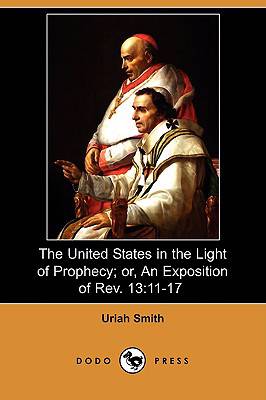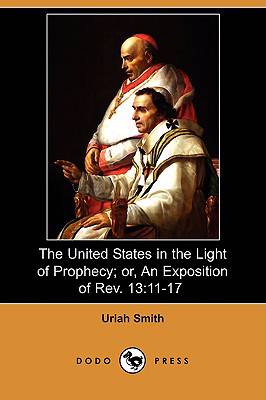
- Afhalen na 1 uur in een winkel met voorraad
- Gratis thuislevering in België vanaf € 30
- Ruim aanbod met 7 miljoen producten
- Afhalen na 1 uur in een winkel met voorraad
- Gratis thuislevering in België vanaf € 30
- Ruim aanbod met 7 miljoen producten
Zoeken
The United States in the Light of Prophecy; Or, an Exposition of REV. 13
11-17 (Dodo Press)
Uriah Smith
Paperback | Engels
€ 11,45
+ 22 punten
Omschrijving
Uriah Smith (1832-1903) was a Seventh-day Adventist author and editor who worked for the Review and Herald for 50 years. In 1853, he began working at the offices of the Advent Review and Sabbath Herald, becoming its editor in 1855. His main contribution to Adventist theology was a commentary on the prophetic Biblical books of Daniel and the Revelation, but he also wrote extensively on conditional immortality and other topics. Smith held several other offices in the Adventist Church, including treasurer of the General Conference. He advocated religious liberty, the abolition of slavery, and noncombatancy for Adventists. His works include: The Warning Voice of Time and Prophecy (1853), The Bible Student's Assistant; or, A Compend of Scripture References (1858), Mortal or Immortal? Which?; or, An Inquiry into the Present Constitution and Future Condition of Man (1860), The Two Covenants (1860s), An Appeal to the Youth: Funeral Address of Henry N. White (1868), Poems (with Rebekah Smith and Annie R. Smith) (1871), The State of the Dead and the Destiny of the Wicked (1873) and The Biblical Institute (with James White) (1878).
Specificaties
Betrokkenen
- Auteur(s):
- Uitgeverij:
Inhoud
- Aantal bladzijden:
- 116
- Taal:
- Engels
Eigenschappen
- Productcode (EAN):
- 9781409943297
- Verschijningsdatum:
- 26/12/2008
- Uitvoering:
- Paperback
- Formaat:
- Trade paperback (VS)
- Afmetingen:
- 152 mm x 229 mm
- Gewicht:
- 181 g

Alleen bij Standaard Boekhandel
+ 22 punten op je klantenkaart van Standaard Boekhandel
Beoordelingen
We publiceren alleen reviews die voldoen aan de voorwaarden voor reviews. Bekijk onze voorwaarden voor reviews.











